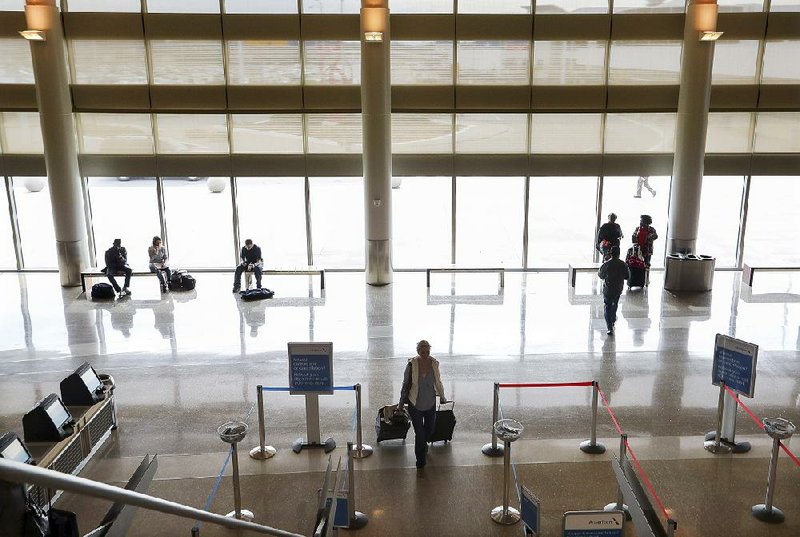Employment at most tenants at Bill and Hillary Clinton National Airport/Adams Field in Little Rock fell 40% through March 31 because of the covid-19 pandemic.
A survey airport staff conducted showed that the 11 participating tenants employed 411 people as of March 1, 2020. Through March 31, they employed 246 people, or 165 fewer than a year earlier.
Of the 165, a total of 143 were furloughed and 22 took early retirement, according to the survey.
Survey participants included Delta Airlines, Southwest Airlines, United Airlines, rental car companies as well as HMS Host, the food and beverage concessionaire.
American Airlines, which has the largest share of passengers at Clinton National, didn't participate.
The survey came as passengers continue to return to the skies although not at the same level they did before the pandemic.
In March, a total of 109,299 passengers went through the airport and marked the first time Clinton National saw more than 100,000 passengers in a month since the pandemic began. The last time the airport reached that benchmark was in February 2020, the last full month before the pandemic's onset, when 151,122 passengers were counted.
March also marked the first time the airport had more passengers in the same month a year earlier. March's totals were 26% higher than than the 86,229 that Clinton National saw in March 2020.
As a result, passenger traffic for the first three months of the year is down just 38.3%. Clinton National saw a total of 395,926 passengers through March 31 compared with 244,141 passengers at the same time in 2020.
Northwest Arkansas National Airport at Highfill continues to recover although at a slower pace because it was so dependent on business travelers before the pandemic. Leisure travel is recovering more quickly than business travel. Clinton National's passenger mix leans to leisure travelers.
The Clinton National tenant survey came in response to queries from Bill Walker and other members of the Little Rock Municipal Airport Commission, which sets policy for the airport.
Walker has objected to granting relief to HMS Host without requiring the concessionaire to open up all of its outlets in the airport. The commission has waived the minimum annual guarantees HMS Host and other tenants are required to pay on a monthly basis.
Other tenants, such as the major airlines, have received billions of dollars under the Coronavirus Aid, Relief and Economic Security Act, a $2 trillion aid package Congress enacted last year to offset the economic impact of lockdowns used to try to keep the pandemic at bay.
But other tenants were "just trying to survive," said John Rutledge, the commission chairman.
Bryan Malinowski, the airport's executive director, told the commission that he knew of no commercial service airport in the United States that hasn't provided some sort of relief to its tenants.
"In some cases, they have deferred rents," he said. "In some cases, they have forgiven rents. Many of these airports have agreed to extend concession agreements two to four years to give the concessionaires the opportunity to recover from the impact of the pandemic."
Baltimore/Washington International Thurgood Marshall Airport, for example, waived fixed rents totaling $16.4 million to its tenants through June.
Walker asked whether any of the tenants given relief at other airports were required to remain open and thus paying their workers.
Malinowski responded that requiring conditions on relief was frowned upon by the Federal Aviation Administration, which told airports in June 2020 that "unjustified hurdles for consideration of relief are not as supportive of the 'we are all in this together' approach sponsors should take during this public health emergency."
"Would you say an unnecessary burden would be not willing to provide health insurance for their employees either as part of a temporary layoff or to terminate them?" Walker responded.
Another commission member, Patrick Schueck, said that the CARES Act took care of people who lost jobs during the pandemic.
They received "$600 tax free in their pockets on top of regular state unemployment benefits, which allowed them to go ahead and live," he said.
Rutledge said any conditions for airport aid were imposed at the federal level, not the local or state level.
"There was an obvious understanding that there were going to be businesses that had to shrink in size and therefore there was an additional unemployment benefit provided," he said. "It's all the above. It's just not one."
Walker conceded, to a point.
"It is all the above," he said. "But what was made clear to me is it is important to us if we're offering assistance that we do so in the spirit of trying to keep things open, trying to keep people employed."
At Clinton National HMS Host employed 79 before the pandemic across its outlets that include a Chick-fil-A, two Starbucks, a Burger King and a Chili's. It all but shut down at the depth of the pandemic but has since has re-opened some of its outlets at the airport.
The concessionaire initially furloughed 77 employees beginning March 17, 2020. The company continued offering health insurance to the furloughed employees through June 15, according to the survey.
Eventually, a total of 44 employees were laid off in October. HMS Host since has re-hired 4 employees. It has a post-pandemic workforce of 26.
The largest employer among the tenants was Enterprise Holdings, which operates the Alamo Rent A Car, Enterprise Rent-A-Car and National Car Rental brands.
Delta Airlines, which received CARES Act funding, didn't have to furlough any of its 26 employees or eliminate any positions. Fourteen employees took early retirement. The airline now has 16 employees at the airport.
The airport has received about $30 million in federal relief money and is scheduled to receive more. It hasn't had to lay off any of its nearly 150-person workforce.
